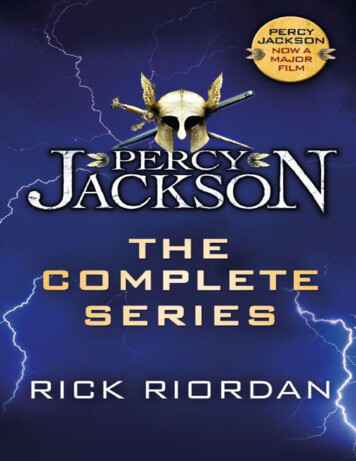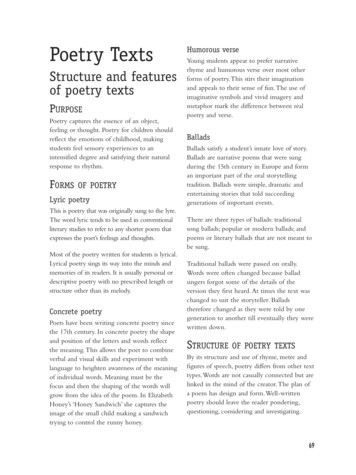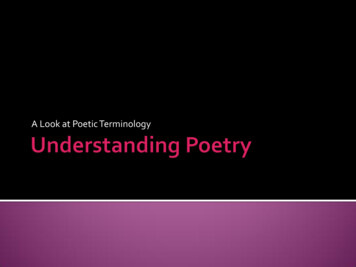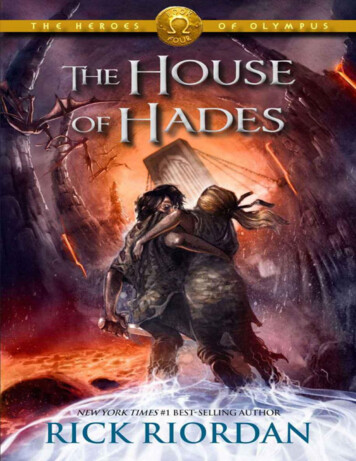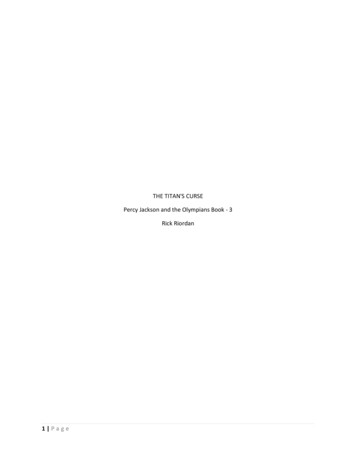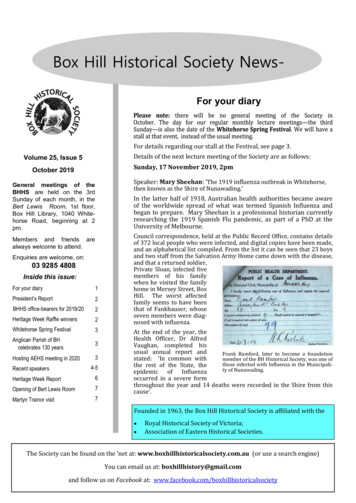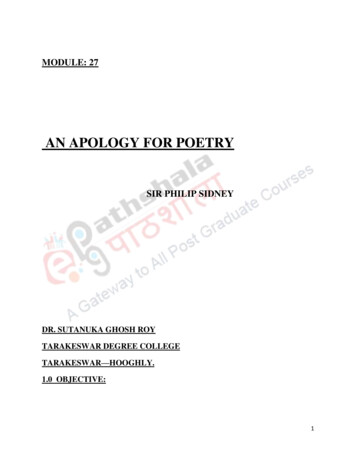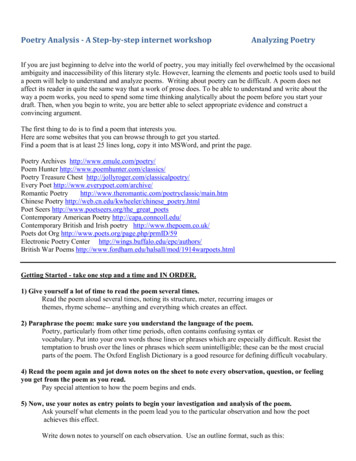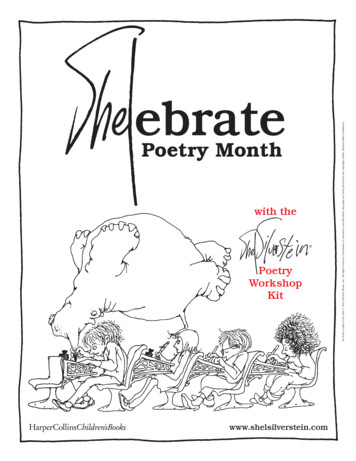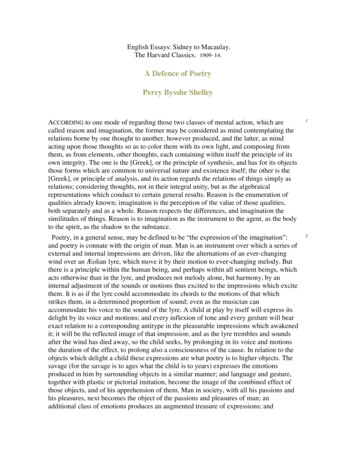
Transcription
English Essays: Sidney to Macaulay.The Harvard Classics. 1909–14.A Defence of PoetryPercy Bysshe ShelleyACCORDING to one mode of regarding those two classes of mental action, which arecalled reason and imagination, the former may be considered as mind contemplating therelations borne by one thought to another, however produced, and the latter, as mindacting upon those thoughts so as to color them with its own light, and composing fromthem, as from elements, other thoughts, each containing within itself the principle of itsown integrity. The one is the [Greek], or the principle of synthesis, and has for its objectsthose forms which are common to universal nature and existence itself; the other is the[Greek], or principle of analysis, and its action regards the relations of things simply asrelations; considering thoughts, not in their integral unity, but as the algebraicalrepresentations which conduct to certain general results. Reason is the enumeration ofqualities already known; imagination is the perception of the value of those qualities,both separately and as a whole. Reason respects the differences, and imagination thesimilitudes of things. Reason is to imagination as the instrument to the agent, as the bodyto the spirit, as the shadow to the substance.1Poetry, in a general sense, may be defined to be ―the expression of the imagination‖:and poetry is connate with the origin of man. Man is an instrument over which a series ofexternal and internal impressions are driven, like the alternations of an ever-changingwind over an Æolian lyre, which move it by their motion to ever-changing melody. Butthere is a principle within the human being, and perhaps within all sentient beings, whichacts otherwise than in the lyre, and produces not melody alone, but harmony, by aninternal adjustment of the sounds or motions thus excited to the impressions which excitethem. It is as if the lyre could accommodate its chords to the motions of that whichstrikes them, in a determined proportion of sound; even as the musician canaccommodate his voice to the sound of the lyre. A child at play by itself will express itsdelight by its voice and motions; and every inflexion of tone and every gesture will bearexact relation to a corresponding antitype in the pleasurable impressions which awakenedit; it will be the reflected image of that impression; and as the lyre trembles and soundsafter the wind has died away, so the child seeks, by prolonging in its voice and motionsthe duration of the effect, to prolong also a consciousness of the cause. In relation to theobjects which delight a child these expressions are what poetry is to higher objects. Thesavage (for the savage is to ages what the child is to years) expresses the emotionsproduced in him by surrounding objects in a similar manner; and language and gesture,together with plastic or pictorial imitation, become the image of the combined effect ofthose objects, and of his apprehension of them. Man in society, with all his passions andhis pleasures, next becomes the object of the passions and pleasures of man; anadditional class of emotions produces an augmented treasure of expressions; and2
language, gesture, and the imitative arts, become at once the representation and themedium, the pencil and the picture, the chisel and the statute, the chord and the harmony.The social sympathies, or those laws from which, as from its elements, society results,begin to develop themselves from the moment that two human beings coexist; the futureis contained within the present, as the plant within the seed; and equality, diversity, unity,contrast, mutual dependence, become the principles alone capable of affording themotives according to which the will of a social being is determined to action, inasmuchas he is social; and constitute pleasure in sensation, virtue in sentiment, beauty in art,truth in reasoning, and love in the intercourse of kind. Hence men, even in the infancy ofsociety, observe a certain order in their words and actions, distinct from that of theobjects and the impressions represented by them, all expression being subject to the lawsof that from which it proceeds. But let us dismiss those more general considerationswhich might involve an inquiry into the principles of society itself, and restrict our viewto the manner in which the imagination is expressed upon its forms.In the youth of the world, men dance and sing and imitate natural objects, observing inthese actions, as in all others, a certain rhythm or order. And, although all men observe asimilar, they observe not the same order, in the motions of the dance, in the melody ofthe song, in the combinations of language, in the series of their imitations of naturalobjects. For there is a certain order or rhythm belonging to each of these classes ofmimetic representation, from which the hearer and the spectator receive an intenser andpurer pleasure than from any other: the sense of an approximation to this order has beencalled taste by modern writers. Every man in the infancy of art observes an order whichapproximates more or less closely to that from which this highest delight results: but thediversity is not sufficiently marked, as that its gradations should be sensible, except inthose instances where the predominance of this faculty of approximation to the beautiful(for so we may be permitted to name the relation between this highest pleasure and itscause) is very great. Those in whom it exists in excess are poets, in the most universalsense of the word; and the pleasure resulting from the manner in which they express theinfluence of society or nature upon their own minds, communicates itself to others, andgathers a sort of reduplication from that community. Their language is vitallymetaphorical; that is, it marks the before unapprehended relations of things andperpetuates their apprehension, until the words which represent them, become, throughtime, signs for portions or classes of thoughts instead of pictures of integral thoughts; andthen if no new poets should arise to create afresh the associations which have been thusdisorganized, language will be dead to all the nobler purposes of human intercourse.These similitudes or relations are finely said by Lord Bacon to be ―the same footsteps ofnature impressed upon the various subjects of the world‖ 1—and he considers the facultywhich perceives them as the storehouse of axioms common to all knowledge. In theinfancy of society every author is necessarily a poet, because language itself is poetry;and to be a poet is to apprehend the true and the beautiful, in a word, the good whichexists in the relation, subsisting, first between existence and perception, and secondlybetween perception and expression. Every original language near to its source is in itselfthe chaos of a cyclic poem: the copiousness of lexicography and the distinctions ofgrammar are the works of a later age, and are merely the catalogue and the form of thecreations of poetry.3
But poets, or those who imagine and express this indestructible order, are not only theauthors of language and of music, of the dance, and architecture, and statuary, andpainting: they are the institutors of laws, and the founders of civil society, and theinventors of the arts of life, and the teachers, who draw into a certain propinquity withthe beautiful and the true that partial apprehension of the agencies of the invisible worldwhich is called religion. Hence all original religions are allegorical, or susceptible ofallegory, and, like Janus, have a double face of false and true. Poets, according to thecircumstances of the age and nation in which they appeared, were called, in the earlierepochs of the world, legislators, or prophets: a poet essentially comprises and unites boththese characters. For he not only beholds intensely the present as it is, and discoversthose laws according to which present things ought to be ordered, but he beholds thefuture in the present, and his thoughts are the germs of the flower and the fruit of latesttime. Not that I assert poets to be prophets in the gross sense of the word, or that they canforetell the form as surely as they foreknow the spirit of events: such is the pretence ofsuperstition, which would make poetry an attribute of prophecy, rather than prophecy anattribute of poetry. A poet participates in the eternal, the infinite, and the one; as far asrelates to his conceptions, time and place and number are not. The grammatical formswhich express the moods of time, and the difference of persons, and the distinction ofplace, are convertible with respect to the highest poetry without injuring it as poetry; andthe choruses of Æschylus, and the book of Job, and Dante’s ―Paradise‖ would afford,more than any other writings, examples of this fact, if the limits of this essay did notforbid citation. The creations of sculpture, painting, and music are illustrations still moredecisive.4Language, color, form, and religious and civil habits of action, are all the instrumentsand materials of poetry; they may be called poetry by that figure of speech whichconsiders the effect as a synonym of the cause. But poetry in a more restricted senseexpresses those arrangements of language, and especially metrical language, which arecreated by that imperial faculty, whose throne is curtained within the invisible nature ofman. And this springs from the nature itself of language, which is a more directrepresentation of the actions and passions of our internal being, and is susceptible ofmore various and delicate combinations, than color, form, or motion, and is more plasticand obedient to the control of that faculty of which it is the creation. For language isarbitrarily produced by the imagination, and has relation to thoughts alone; but all othermaterials, instruments, and conditions of art have relations among each other, which limitand interpose between conception and expression. The former is as a mirror whichreflects, the latter as a cloud which enfeebles, the light of which both are mediums ofcommunication. Hence the fame of sculptors, painters, and musicians, although theintrinsic powers of the great masters of these arts may yield in no degree to that of thosewho have employed language as the hieroglyphic of their thoughts, has never equalledthat of poets in the restricted sense of the term; as two performers of equal skill willproduce unequal effects from a guitar and a harp. The fame of legislators and founders ofreligions, so long as their institutions last, alone seems to exceed that of poets in therestricted sense; but it can scarcely be a question, whether, if we deduct the celebritywhich their flattery of the gross opinions of the vulgar usually conciliates, together withthat which belonged to them in their higher character of poets, any excess will remain.5
We have thus circumscribed the word poetry within the limits of that art which is themost familiar and the most perfect expression of the faculty itself. It is necessary,however, to make the circle still narrower, and to determine the distinction betweenmeasured and unmeasured language; for the popular division into prose and verse isinadmissible in accurate philosophy.6Sounds as well as thoughts have relation both between each other and towards thatwhich they represent, and a perception of the order of those relations has always beenfound connected with a perception of the order of the relations of thoughts. Hence thelanguage of poets has ever affected a certain uniform and harmonious recurrence ofsound, without which it were not poetry, and which is scarcely less indispensable to thecommunication of its influence, than the words themselves, without reference to thatpeculiar order. Hence the vanity of translation; it were as wise to cast a violet into acrucible that you might discover the formal principle of its color and odor, as seek totransfuse from one language into another the creations of a poet. The plant must springagain from its seed, or it will bear no flower—and this is the burden of the curse ofBabel.7An observation of the regular mode of the recurrence of harmony in the language ofpoetical minds, together with its relation to music, produced metre, or a certain system oftraditional forms of harmony and language. Yet it is by no means essential that a poetshould accommodate his language to this traditional form, so that the harmony, which isits spirit, be observed. The practice is indeed convenient and popular, and to be preferred,especially in such composition as includes much action: but every great poet mustinevitably innovate upon the example of his predecessors in the exact structure of hispeculiar versification. The distinction between poets and prose writers is a vulgar error.The distinction between philosophers and poets has been anticipated. Plato wasessentially a poet—the truth and splendor of his imagery, and the melody of hislanguage, are the most intense that it is possible to conceive. He rejected the measure ofthe epic, dramatic, and lyrical forms, because he sought to kindle a harmony in thoughtsdivested of shape and action, and he forebore to invent any regular plan of rhythm whichwould include, under determinate forms, the varied pauses of his style. Cicero sought toimitate the cadence of his periods, but with little success. Lord Bacon was a poet. 2 Hislanguage has a sweet and majestic rhythm, which satisfies the sense, no less than thealmost superhuman wisdom of his philosophy satisfies the intellect; it is a strain whichdistends, and then bursts the circumference of the reader’s mind, and pours itself forthtogether with it into the universal element with which it has perpetual sympathy. All theauthors of revolutions in opinion are not only necessarily poets as they are inventors, noreven as their words unveil the permanent analogy of things by images which participatein the life of truth; but as their periods are harmonious and rhythmical, and contain inthemselves the elements of verse; being the echo of the eternal music. Nor are thosesupreme poets, who have employed traditional forms of rhythm on account of the formand action of their subjects, less capable of perceiving and teaching the truth of things,than those who have omitted that form. Shakespeare, Dante, and Milton (to confineourselves to modern writers) are philosophers of the very loftiest power.8A poem is the very image of life expressed in its eternal truth. There is this differencebetween a story and a poem, that a story is a catalogue of detached facts, which have no9
other connection than time, place, circumstance, cause and effect; the other is thecreation of actions according to the unchangeable forms of human nature, as existing inthe mind of the Creator, which is itself the image of all other minds. The one is partial,and applies only to a definite period of time, and a certain combination of events whichcan never again recur; the other is universal, and contains within itself the germ of arelation to whatever motives or actions have place in the possible varieties of humannature. Time, which destroys the beauty and the use of the story of particular facts,stripped of the poetry which should invest them, augments that of poetry, and foreverdevelops new and wonderful applications of the eternal truth which it contains. Henceepitomes have been called the moths of just history; they eat out the poetry of it. A storyof particular facts is as a mirror which obscures and distorts that which should bebeautiful; poetry is a mirror which makes beautiful that which is distorted.The parts of a composition may be poetical, without the composition as a whole being apoem. A single sentence may be considered as a whole, though it may be found in themidst of a series of unassimilated portions; a single word even may be a spark ofinextinguishable thought. And thus all the great historians, Herodotus, Plutarch, Livy,were poets; and although the plan of these writers, especially that of Livy, restrainedthem from developing this faculty in its highest degree, they made copious and ampleamends for their subjection, by filling all the interstices of their subjects with livingimages.10Having determined what is poetry, and who are poets, let us proceed to estimate itseffects upon society.11Poetry is ever accompanied with pleasure: all spirits on which it falls open themselvesto receive the wisdom which is mingled with its delight. In the infancy of the world,neither poets themselves nor their auditors are fully aware of the excellence of poetry: forit acts in a divine and unapprehended manner, beyond and above consciousness; and it isreserved for future generations to contemplate and measure the mighty cause and effectin all the strength and splendor of their union. Even in modern times, no living poet everarrived at the fulness of his fame; the jury which sits in judgment upon a poet, belongingas he does to all time, must be composed of his peers: it must be impanelled by Timefrom the selectest of the wise of many generations. A poet is a nightingale, who sits indarkness and sings to cheer its own solitude with sweet sounds; his auditors are as menentranced by the melody of an unseen musician, who feel that they are moved andsoftened, yet know not whence or why. The poems of Homer and his contemporarieswere the delight of infant Greece; they were the elements of that social system which isthe column upon which all succeeding civilization has reposed. Homer embodied theideal perfection of his age in human character; nor can we doubt that those who read hisverses were awakened to an ambition of becoming like to Achilles, Hector, and Ulysses:the truth and beauty of friendship, patriotism, and persevering devotion to an object,were unveiled to the depths in these immortal creations: the sentiments of the auditorsmust have been refined and enlarged by a sympathy with such great and lovelyimpersonations, until from admiring they imitated, and from imitation they identifiedthemselves with the objects of their admiration. Nor let it be objected that thesecharacters are remote from moral perfection, and that they can by no means beconsidered as edifying patterns for general imitation. Every epoch, under names more or12
less specious, has deified its peculiar errors; Revenge is the naked idol of the worship ofa semi-barbarous age: and Self-deceit is the veiled image of unknown evil, before whichluxury and satiety lie prostrate. But a poet considers the vices of his contemporaries asthe temporary dress in which his creations must be arrayed, and which cover withoutconcealing the eternal proportions of their beauty. An epic or dramatic personage isunderstood to wear them around his soul, as he may the ancient armor or the modernuniform around his body; whilst it is easy to conceive a dress more graceful than either.The beauty of the internal nature cannot be so far concealed by its accidental vesture, butthat the spirit of its form shall communicate itself to the very disguise, and indicate theshape it hides from the manner in which it is worn. A majestic form and graceful motionswill express themselves through the most barbarous and tasteless costume. Few poets ofthe highest class have chosen to exhibit the beauty of their conceptions in its naked truthand splendor; and it is doubtful whether the alloy of costume, habit, etc., be not necessaryto temper this planetary music for mortal ears.The whole objection, however, of the immorality of poetry rests upon a misconceptionof the manner in which poetry acts to produce the moral improvement of man. Ethicalscience arranges the elements which poetry has created, and propounds schemes andproposes examples of civil and domestic life: nor is it for want of admirable doctrinesthat men hate, and despise, and censure, and deceive, and subjugate one another. Butpoetry acts in another and diviner manner. It awakens and enlarges the mind itself byrendering it the receptacle of a thousand unapprehended combinations of thought. Poetrylifts the veil from the hidden beauty of the world, and makes familiar objects be as if theywere not familiar; it reproduces all that it represents, and the impersonations clothed inits Elysian light stand thenceforward in the minds of those who have once contemplatedthem, as memorials of that gentle and exalted content which extends itself over allthoughts and actions with which it coexists. The great secret of morals is love; or a goingout of our nature, and an identification of ourselves with the beautiful which exists inthought, action, or person, not our own. A man, to be greatly good, must imagineintensely and comprehensively; he must put himself in the place of another and of manyothers; the pains and pleasure of his species must become his own. The great instrumentof moral good is the imagination; and poetry administers to the effect by acting upon thecause. Poetry enlarges the circumference of the imagination by replenishing it withthoughts of ever new delight, which have the power of attracting and assimilating to theirown nature all other thoughts, and which form new intervals and interstices whose voidforever craves fresh food. Poetry strengthens the faculty which is the organ of the moralnature of man, in the same manner as exercise strengthens a limb. A poet therefore woulddo ill to embody his own conceptions of right and wrong, which are usually those of hisplace and time, in his poetical creations, which participate in neither. By this assumptionof the inferior office of interpreting the effect, in which perhaps after all he might acquithimself but imperfectly, he would resign a glory in a participation in the cause. Therewas little danger that Homer, or any of the eternal poets, should have so farmisunderstood themselves as to have abdicated this throne of their widest dominion.Those in whom the poetical faculty, though great, is less intense, as Euripides, Lucan,Tasso, Spenser, have frequently affected a moral aim, and the effect of their poetry isdiminished in exact proportion to the degree in which they compel us to advert to thispurpose.13
Homer and the cyclic poets were followed at a certain interval by the dramatic andlyrical poets of Athens, who flourished contemporaneously with all that is most perfectin the kindred expressions of the poetical faculty; architecture, painting, music, thedance, sculpture, philosophy, and, we may add, the forms of civil life. For although thescheme of Athenian society was deformed by many imperfections which the poetryexisting in chivalry and Christianity has erased from the habits and institutions of modernEurope; yet never at any other period has so much energy, beauty, and virtue beendeveloped; never was blind strength and stubborn form so disciplined and renderedsubject to the will of man, or that will less repugnant to the dictates of the beautiful andthe true, as during the century which preceded the death of Socrates. Of no other epochin the history of our species have we records and fragments stamped so visibly with theimage of the divinity in man. But it is poetry alone, in form, in action, or in language,which has rendered this epoch memorable above all others, and the store-house ofexamples to everlasting time. For written poetry existed at that epoch simultaneouslywith the other arts, and it is an idle inquiry to demand which gave and which received thelight, which all, as from a common focus, have scattered over the darkest periods ofsucceeding time. We know no more of cause and effect than a constant conjunction ofevents: poetry is ever found to coexist with whatever other arts contribute to thehappiness and perfection of man. I appeal to what has already been established todistinguish between the cause and the effect.14It was at the period here adverted to that the drama had its birth; and however asucceeding writer may have equalled or surpassed those few great specimens of theAthenian drama which have been preserved to us, it is indisputable that the art itselfnever was understood or practised according to the true philosophy of it, as at Athens.For the Athenians employed language, action, music, painting, the dance, and religiousinstitutions, to produce a common effect in the representation of the highest idealism ofpassion and of power; each division in the art was made perfect in its kind of artists ofthe most consummate skill, and was disciplined into a beautiful proportion and unity onetowards the other. On the modern stage a few only of the elements capable of expressingthe image of the poet’s conception are employed at once. We have tragedy without musicand dancing; and music and dancing without the highest impersonations of which theyare the fit accompaniment, and both without religion and solemnity. Religious institutionhas indeed been usually banished from the stage. Our system of divesting the actor’s faceof a mask, on which the many expressions appropriated to his dramatic character mightbe moulded into one permanent and unchanging expression, is favorable only to a partialand inharmonious effect; it is fit for nothing but a monologue, where all the attentionmay be directed to some great master of ideal mimicry. The modern practice of blendingcomedy with tragedy, though liable to great abuse in point of practice, is undoubtedly anextension of the dramatic circle; but the comedy should be as in ―King Lear,‖ universal,ideal, and sublime. It is perhaps the intervention of this principle which determines thebalance in favor of ―King Lear‖ against the ―Oedipus Tyrannus‖ or the ―Agamemnon,‖or, if you will, the trilogies with which they are connected; unless the intense power ofthe choral poetry, especially that of the latter, should be considered as restoring theequilibrium. ―King Lear,‖ if it can sustain this comparison, may be judged to be the mostperfect specimen of the dramatic art existing in the world; in spite of the narrowconditions to which the poet was subjected by the ignorance of the philosophy of the15
drama which has prevailed in modern Europe. Calderon, in his religious autos, hasattempted to fulfil some of the high conditions of dramatic representation neglected byShakespeare; such as the establishing a relation between the drama and religion, and theaccommodating them to music and dancing; but he omits the observation of conditionsstill more important, and more is lost than gained by the substitution of the rigidlydefined and ever-repeated idealisms of a distorted superstition for the livingimpersonations of the truth of human passion.But I digress. The connection of scenic exhibitions with the improvement or corruptionof the manners of men has been universally recognized; in other words, the presence orabsence of poetry in its most perfect and universal form has been found to be connectedwith good and evil in conduct or habit. The corruption which has been imputed to thedrama as an effect, begins, when the poetry employed in its constitution ends: I appeal tothe history of manners whether the periods of the growth of the one and the decline of theother have not corresponded with an exactness equal to any example of moral cause andeffect.16The drama at Athens, or wheresoever else it may have approached to its perfection, evercoexisted with the moral and intellectual greatness of the age. The tragedies of theAthenian poets are as mirrors in which the spectator beholds himself, under a thindisguise of circumstance, stripped of all but that ideal perfection and energy whicheveryone feels to be the internal type of all that he loves, admires, and would become.The imagination is enlarged by a sympathy with pains and passions so mighty, that theydistend in their conception the capacity of that by which they are conceived; the goodaffections are strengthened by pity, indignation, terror, and sorrow; and an exalted calmis prolonged from the satiety of this high exercise of them into the tumult of familiar life:even crime is disarmed of half its horror and all its contagion by being represented as thefatal consequence of the unfathomable agencies of nature; error is thus divested of itswilfulness; men can no longer cherish it as the creation of their choice. In a drama of thehighest order there is little food for censure or hatred; it teaches rather self-knowledgeand self-respect. Neither the eye nor the mind can see itself, unless reflected upon thatwhich it resembles. The drama, so long as it continues to express poetry, is as a prismaticand many-sided mirror, which collects the brightest rays of human nature and dividesand reproduces them from the simplicity of these elementary forms, and touches themwith majesty and beauty, and multiplies all that it reflects, and endows it with the powerof propagating its like wherever it may fall.17But in periods of the decay of social life, the drama sympathizes with that decay.Tragedy becomes a cold imitation of the form of the great masterpieces of antiquity,divested of all harmonious accompaniment of the kindred arts; and often the very formmisunderstood, or a weak attempt to teach certain doctrines, which the writer considersas moral truths; and which are usually no more than specious flatteries of some grossvice or weakness, with which the author, in common with his auditors, are infected.Hence what has been called the classical and domestic drama. Addison’s ―Cato‖ is aspecimen of the one; and would it were not superfluous to cite examples of the other! Tosuch purposes poetry cannot be made subservient. Poetry is a sword of lightning, everunsheathed, which consumes the scabbard that would contain it. And thus we observethat all dramatic writings of this nature are unimaginative in a singular degree; they18
affect sentiment and passion, which, divested of imagination, are other names for capriceand appetite. The period in our own history of the grossest degradatio
The one is the [Greek], or the principle of synthesis, and has for its objects those forms which are common to universal nature and existence itself; the other is the [Greek], or principle of analysis, and its action regards the relations of things simply as . additional class of emotions produces an augmented treasure of expressions; and .
